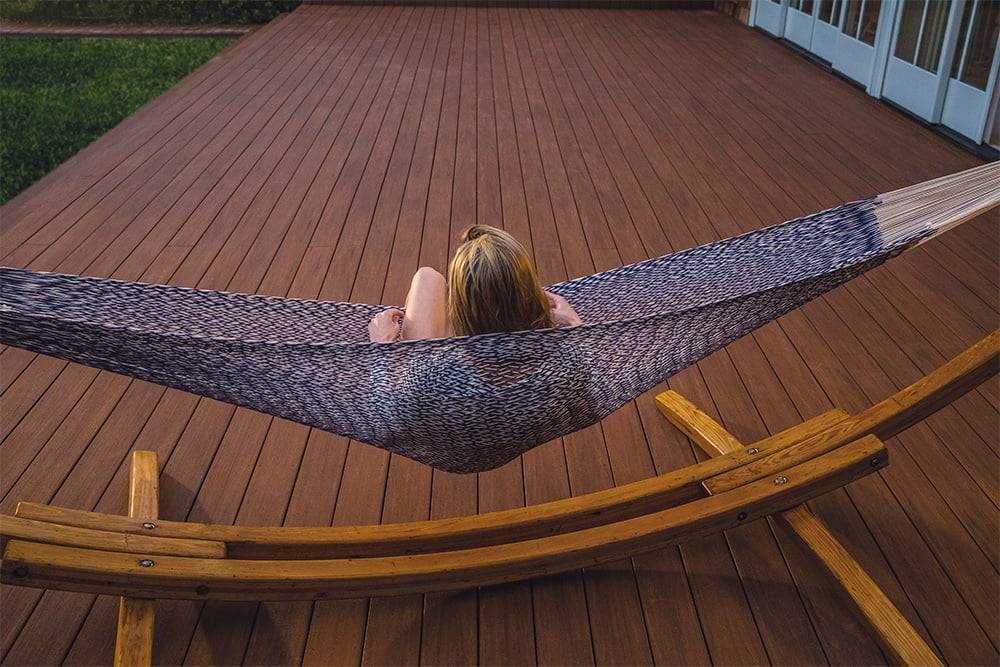
When it comes to choosing a decking material for your outdoor living space, there are several options available in the market. However, two of the most popular materials are composite decking and PVC decking.
Both composite and PVC decking offer many benefits over traditional wood decking, such as durability, low maintenance, and long-lasting beauty.
In this article, we will compare composite decking vs PVC decking, examining their similarities and differences, to help you decide which material is the right choice for your deck.
Composition
Composite decking is made of a mixture of wood fibers, plastic, and binding agents. The wood fibers provide the natural look and feel of wood, while the plastic provides durability and resistance to moisture, insects, and rot. The binding agents hold the mixture together and provide structural support.
PVC decking, on the other hand, is made entirely of plastic, specifically polyvinyl chloride (PVC). The material is a combination of plastic resin and additives, which provide strength, color, and texture.
Durability
Both composite and PVC decking are highly durable and resistant to moisture, insects, and rot. They are also resistant to fading, staining, and scratching, which makes them ideal for high-traffic areas. However, there are some differences in their durability.
Composite decking is more susceptible to mold and mildew growth, especially in areas with high humidity or moisture. This is because wood fibers in the composite decking can absorb moisture and provide a breeding ground for mold and mildew. To prevent mold and mildew growth, composite decking requires regular cleaning and maintenance.
PVC decking, on the other hand, is 100% moisture-resistant and does not absorb water, making it less susceptible to mold and mildew growth. It’s also more resistant to scratches and dents opposed to composite decking, as it has a harder surface. PVC decking is a good option for high-traffic areas and wet environments such as pool decks and boat docks.
Maintenance
Both composite and PVC decking require very little maintenance compared to traditional softwood decking. They do not need to be stained or sealed, and they are resistant to fading, staining, and scratching. However, there are some differences in their maintenance requirements.
Composite decking requires regular cleaning and maintenance to prevent mold and mildew growth. The decking should be cleaned at least twice a year using a mild detergent and a soft-bristled brush.
PVC decking, on the other hand, requires very little maintenance. It does not need to be cleaned as often as composite decking, and is less prone to moisture issues like mold and mildew. PVC decking is also less likely to stain than composite decking, making it an ideal choice for outdoor living spaces where spills and stains are common.
Appearance
Both composite and PVC decking are available in a wide range of colors and styles, that resemble natural wood, such as cedar or redwood. However, there are some differences in their appearance.
Cheaper grades of composite decking often has a repeating embossed cathedral wood grain that tends to look fake and less attractive. This is a good option for outdoor living spaces on a budget.
Luxury composite decking typically has a plastic cap with more visually appealing wood grains in a variety of colors and textures, allowing homeowners to choose the style that best matches their home’s exterior.
PVC decking, on the other hand, has a more uniform appearance and is available in a wider range of colors than composite decking.
PVC decking is also available in a variety of textures and simulated wood grain allowing homeowners to choose a style that best matches their home’s exterior.
Cost
Both composite and PVC decking are more expensive than traditional softwood decking. However, there are some differences in their cost.
Composite decking is typically less expensive than PVC decking, making it a good option for homeowners on a budget. PVC decking tends to be a little more expensive but can be the better choice if you are in an extreme climate with lots of moisture.